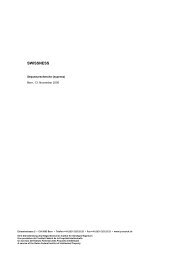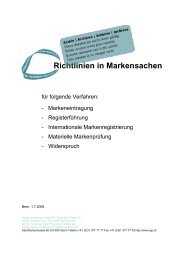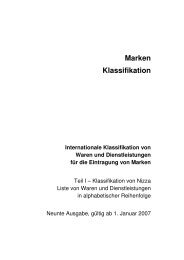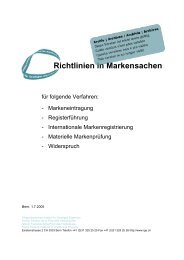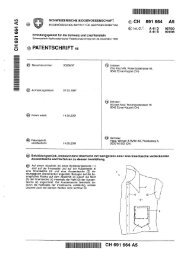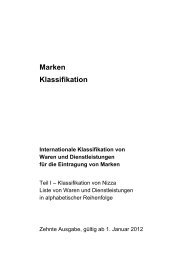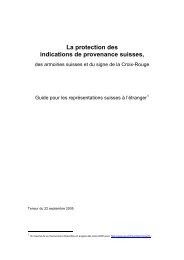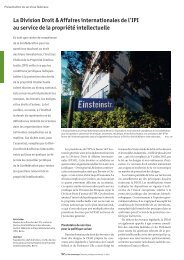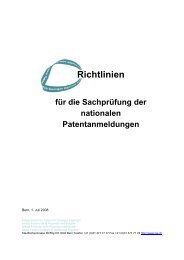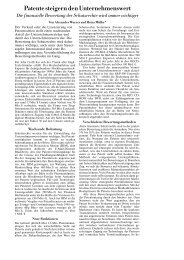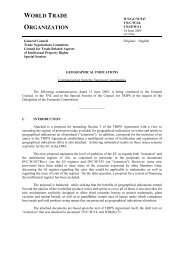AVIS DE DROIT PROTECTION DES SIGNES NATIONAUX
AVIS DE DROIT PROTECTION DES SIGNES NATIONAUX
AVIS DE DROIT PROTECTION DES SIGNES NATIONAUX
You also want an ePaper? Increase the reach of your titles
YUMPU automatically turns print PDFs into web optimized ePapers that Google loves.
ROYAUME-UNI<br />
and Uniforms) Act 1926 to make commercial use of its name, uniform or badge, or of the<br />
terms by which its members are commonly known.<br />
A person who wishes to avoid civil liability for passing off does not need to obtain any kind<br />
of formal authorisation.<br />
5. Protection du signe national «suisse»<br />
The Swiss national flag and arms (ie. the flag on a heraldic shield) are protected against<br />
registration in the United Kingdom as part of a trade mark. It is not clear whether other Swiss<br />
heraldic arms would benefit from similar protection; refer to point 3. d) (i) above. Nothing<br />
prevents the registration of “Swiss” or “Switzerland” or similar words as part of a trade mark.<br />
There is nothing to prevent anyone who wishes to do so from registering a company or<br />
carrying on a business in the United Kingdom under a name that includes “Swiss” or<br />
“Switzerland” or similar words.<br />
Goods bearing a false appellation of origin (for example, goods labelled “made in<br />
Switzerland” which were in reality substantially manufactured elsewhere) may not be<br />
imported into the United Kingdom. As concerns goods manufactured in the United Kingdom,<br />
a person who prepares, offers or sells them under a description to the effect that they were<br />
produced in Switzerland, or produced, tested or approved by a Swiss entity, commits a<br />
criminal offence if that description is not true. A Swiss competitor, or indeed the Swiss<br />
Confederation, could prosecute such a person in the British courts. Alternatively, they could<br />
ask the British authorities to commence a prosecution. It should be noted however, that the<br />
British authorities show reluctance to prosecute even in respect of false claims that goods are<br />
“made in Britain”. This is because competitively priced products are increasingly composed<br />
of elements manufactured in various countries, especially low-cost economies, and British<br />
trade policy demands that enterprises based in the United Kingdom should nevertheless be<br />
able to market as many as possible of these products as “made in Britain”.<br />
Swiss organisations such as the Offiziersverein or the Päpstliche Schweizergarde, which<br />
might be regarded as analogous to the British public interest organisations that have been<br />
designated under the Chartered Associations (Protection of Names and Uniforms) Act 1926,<br />
cannot be similarly designated, because the operation of the legislation is expressly restricted,<br />
under subsec. 1(1), to organisations created by British Royal Charter.<br />
The extended form of civil liability for “passing off” goods as having similar characteristics to<br />
those of a class of manufacturers, established by the House of Lords in respect of “advocaat”,<br />
was subsequently successfully invoked in the English courts by Kraft Jacobs Suchard<br />
(Schweiz) AG and Chocoladefabriken Lindt und Sprüngli (Schweiz) AG in respect of “Swiss<br />
chocolate” 315 . The largest British retail chocolate manufacturer, Cadbury Ltd, had sold quite<br />
large qualities of a chocolate tablet labelled “Swiss Chalet” and packaged with a<br />
representation of the Matterhorn. The trial judge found it proven by evidence that a<br />
substantial number of British consumers would have been induced by that labelling and<br />
315<br />
Chocosuisse Union des Fabricants Suisses de Chocolat v. Cadbury Ltd, [1999] Reports of Patent<br />
Cases 826.<br />
201



